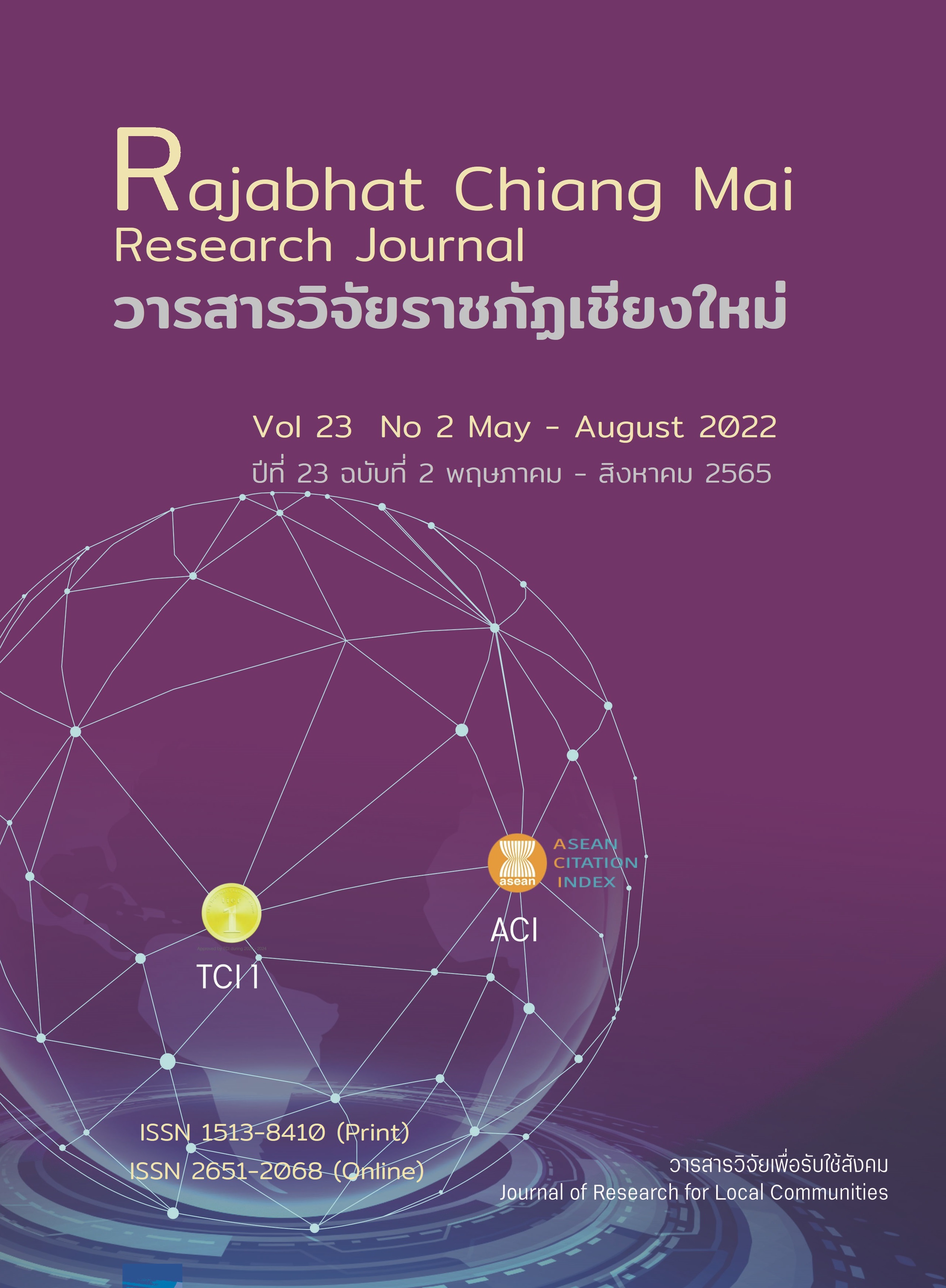รูปแบบการท่องเที่ยวในมิติเศรษฐกิจพอเพียงลุ่มน้ำแม่วางตอนบน
DOI:
https://doi.org/10.14456/rcmrj.2022.251150คำสำคัญ:
รูปแบบการท่องเที่ยวในมิติเศรษฐกิจพอเพียง , ลุ่มน้ำแม่วางตอนบนบทคัดย่อ
งานวิจัยเรื่อง รูปแบบการท่องเที่ยวในมิติเศรษฐกิจพอเพียงลุ่มน้ำแม่วางตอนบน มีวัตถุประสงค์
เพื่อสร้างรูปแบบการท่องเที่ยวในมิติเศรษฐกิจพอเพียงในสังคมชาวนา กำหนดแนวทางการตลาดในการประกอบธุรกิจการท่องเที่ยวในมิติเศรษฐกิจพอเพียงในสังคมชาวนา และเพื่อการอนุรักษ์ทรัพยากรการท่องเที่ยวอย่างยั่งยืน งานวิจัยดังกล่าวเป็นงานวิจัยเชิงคุณภาพ (Qualitative Research) โดยพื้นที่วิจัยอยู่ในเขตลุ่มน้ำแม่วางตอนบนซึ่งประกอบด้วย 4 หมู่บ้าน ได้แก่ บ้านโป่งสมิต บ้านห้วยอีค่าง บ้านห้วยตอง และบ้านขุนวาง สำหรับกลุ่มตัวอย่างการวิจัย ได้แก่ ผู้ให้ข้อมูลสำคัญอย่างน้อยหมู่บ้านละ 10 คน โดยคัดเลือกจากตัวแทนชุมชน ผู้นำชุมชน คณะกรรมการชุมชน และ/หรือผู้อาวุโสที่อาศัยอยู่ในชุมชนไม่น้อยกว่า 10 ปี และ
ผู้มีส่วนได้เสีย (Stakeholder) ฝ่ายราชการ และฝ่ายเอกชนอย่างน้อย 10 คน โดยคัดเลือกจากหน่วยงานที่มีความเกี่ยวข้องกับการท่องเที่ยวในมิติเศรษฐกิจพอเพียงของพื้นที่เป้าหมาย วิธีดำเนินการวิจัยด้วยการศึกษาแบบการวิจัยเพื่อสร้างชุดการท่องเที่ยวในมิติเศรษฐกิจพอเพียงสอดคล้องกับภูมิสังคม โดยเน้นให้ชาวบ้าน ผู้มาเยือนหรือนักท่องเที่ยวเห็นคุณค่าของประวัติศาสตร์ วัฒนธรรม และการอนุรักษ์ทรัพยากรธรรมชาติ
เกิดรูปแบบการพัฒนาร่วมสมัยที่เหมาะสมกับปัจจุบัน ผลการวิจัยพบว่าพื้นที่ดังกล่าวมีศักยภาพในการท่องเที่ยวเชิงการเกษตรวัฒนธรรมและการท่องเที่ยวเชิงนิเวศวัฒนธรรมสามารถสร้างชุดการท่องเที่ยว
บนวิถีชีวิต เช่น การท่องเที่ยวสวนผัก นาในหุบเขา การปลูกดอกไม้ การท่องเที่ยวชมวัฒนธรรมระบบเหมืองฝาย การท่องเที่ยวชมดอกนางพญาเสือโคร่ง สวนสตรอว์เบอร์รี่ และสวนกาแฟ การท่องเที่ยวแบบวิ่งเทรล (Trail Running) ในหุบเขา การจัดกิจกรรมโฮมสเตย์ รวมทั้งการจัดจำหน่ายผลผลิตในท้องถิ่น ในระบบการตลาด มีการจัดการตลาดทั้งในรูปแบบการขายตรง และขายผ่านตัวแทนจำหน่ายในเมือง โดยเน้น
อัตลักษณ์ของผลิตภัณฑ์ทางการท่องเที่ยวและมีระบบการขายทั้งในรูปแบบออนไลน์ (Online) และอ๊อฟไลน์ (Offline) เพื่อให้กลุ่มตลาดเป้าหมายเข้าถึงผลิตภัณฑ์ทางการท่องเที่ยวให้ได้มากที่สุด รูปแบบในการอนุรักษ์ทรัพยากรการท่องเที่ยวอย่างยั่งยืนของลุ่มน้ำแม่วางตอนบน ควรประกอบด้วย การอนุรักษ์ทรัพยากรธรรมชาติ การอนุรักษ์วิถีชีวิต ประเพณี วัฒนธรรมและภูมิปัญญา และการใช้หลักปรัชญาของเศรษฐกิจพอเพียงในการอนุรักษ์ทรัพยากรการท่องเที่ยว ผลประโยชน์ที่เกิดขึ้นจากการท่องเที่ยวต้องกลมกลืนทั้งด้านเศรษฐกิจ สังคม และสิ่งแวดล้อม เพื่อให้เกิดความยั่งยืนในอนาคต การวิจัยดังกล่าวเป็นเพียงงานวิจัยต้นน้ำ คือ การสร้างผลิตภัณฑ์หรือรูปแบบของการท่องเที่ยว ซึ่งเป็นจุดเริ่มต้นของการต่อยอดทรัพยากรในท้องถิ่นและการส่งเสริมการตลาด โดยมีข้อเสนอแนะ คือ การขยายพื้นที่วิจัยในลุ่มน้ำแม่วางตอนบนเพื่อเป็นการอนุรักษ์ทรัพยากรธรรมชาติ วัฒนธรรม และสิ่งแวดล้อม รวมทั้งการยกระดับคุณภาพชีวิตสังคมชาวนา และการเกษตรให้ดีขึ้นผ่านรูปแบบกิจกรรมการท่องเที่ยวในมิติเศรษฐกิจพอเพียง
Downloads
เอกสารอ้างอิง
Bangkokbiznews. (2022). Bangkok Ranks Among the 10 best cities in Southeast Asia. Retrieved from https://www.bangkokbiznews.com/lifestyle/lifestyle_travel/1013734 (In Thai)
Chompoonoi, S. (2017). The Study of an Additional Value for A Community Based Tourism, The Case Study of Ban Chiang, Udon Thani. Bangkok: National Defence College. (In Thai)
Choochat, C., & Boonchai, T (2018). Royal Tourism into Sustainable development. Chiang Mai: King’s Philosophy for Local Development Center, Chiang Mai Rajabhat University. (In Thai)
Choochat, C. (2019). Tourism in Sufficiency Economy Manual. Chiang Mai: King’s Philosophy for Local Development Center, Chiang Mai Rajabhat University. (In Thai)
Choochat, C., et al. (2001). An Ecotourism Model for Wang River Area Project. Chiang Mai: Chiang Mai Rajabhat Institute. (In Thai)
Ministry of Tourism & Sports. (2019). Tourism Receipts from International Tourism Arrivals. Retrieved from https://www.mots.go.th/more_news_new.php?cid=411
Ministry of Tourism & Sports. (2021). Tourism Statistic. Retrieved from https://www.mots.go.th/more_news_new.php?cid=411 (In Thai)
Sukto, N., et al. (2015). Marketing an Introduction. (2nded.). Bangkok: Pearson Education Indochina. (In Thai)
The King’s Philosophy Inheritance Committee. (2017). The Driving Inheritance of The King’s Philosophy. Bangkok: The Secretariat of The House of Representatives. (In Thai)
UNWTO. (2019). World Tourism Barometer. Retrieved from cf.cdn.unwto.orglsiteslall/files/pdf/unwto_barom19_01january_excerpt.pdf
UNWTO. (2021). World Tourism Trends Report. Retrieved from https://thaibizchina.com/unwto-%E0%B8%8A%E0%B8%B5%E0%B9%89-%E0%B8%A2%E0%B8%AD%E0%B8%94%E0%B9%83%E0%B8%8A%E0%B9%89%E0%B8%88%E0%B9%88%E0%B8%B2%E0%B8%A2%E0%B8%99%E0%B8%B1%E0%B8%81%E0%B8%97%E0%B9%88%E0%B8%AD%E0%B8%87%E0%B9%80/ (In Thai)
Wattanalaungarun, W. (2001). Agrotourism in Weir System of Local Wisdom: Case Study of Huay E-Khang Village, Mae Win Subdistrict, Mae Wang District, Chiang Mai Province. (M.A., Chiang Mai University). (In Thai)
ดาวน์โหลด
เผยแพร่แล้ว
รูปแบบการอ้างอิง
ฉบับ
ประเภทบทความ
สัญญาอนุญาต
ลิขสิทธิ์ (c) 2022 วารสารวิจัยราชภัฏเชียงใหม่

อนุญาตภายใต้เงื่อนไข Creative Commons Attribution-NonCommercial-NoDerivatives 4.0 International License.
1. บทความ ข้อมูล เนื้อหา รูปภาพ ฯลฯ ที่ได้รับการตีพิมพ์ใน “Community and Social Development Journal” ถือเป็นลิขสิทธิ์ของ Community and Social Development Journal มหาวิทยาลัยราชภัฏเชียงใหม่ และเพื่อให้เผยแพร่บทความได้อย่างเหมาะสมผ่านสื่อสิ่งพิมพ์และอิเล็กทรอนิกส์ ผู้เขียนยังคงถือครองลิขสิทธิ์บทความที่ตีพิมพ์ภายใต้ใบอนุญาต Creative Commons Attribution (CC BY) ซึ่งอนุญาตให้เผยแพร่บทความซ้ำในแหล่งอื่นได้ โดยอ้างอิงต้องอ้งอิงบทความในวารสาร ผู้เขียนต้องรับผิดชอบในการขออนุญาตผลิตซ้ำเนื้อหาที่มีลิขสิทธิ์จากแหล่งอื่น
2. เนื้อหาบทความที่ปรากฏในวารสารเป็นความรับผิดชอบของผู้เขียนบทความโดยตรง ซึ่งกองบรรณาธิการวารสารไม่จำเป็นต้องเห็นด้วยหรือร่วมรับผิดชอบใดๆ














